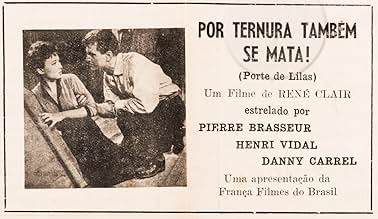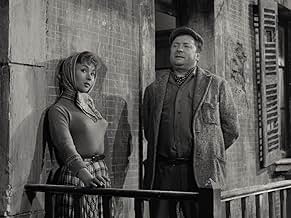IMDb-BEWERTUNG
7,1/10
805
IHRE BEWERTUNG
Füge eine Handlung in deiner Sprache hinzuAn old bum becomes infatuated with a pretty young girl who gets entangled with a young gangster.An old bum becomes infatuated with a pretty young girl who gets entangled with a young gangster.An old bum becomes infatuated with a pretty young girl who gets entangled with a young gangster.
- Regie
- Drehbuch
- Hauptbesetzung
- Für 1 Oscar nominiert
- 1 Gewinn & 5 Nominierungen insgesamt
Robert Balpo
- Un habitué du café
- (Nicht genannt)
Georges Bever
- Le pharmacien
- (Nicht genannt)
Teddy Bilis
- Un secrétaire au commissariat
- (Nicht genannt)
Charles Bouillaud
- L'agent
- (Nicht genannt)
Louis Bugette
- Le brigadier
- (Nicht genannt)
Gérard Buhr
- Un inspecteur
- (Nicht genannt)
Christian Denhez
- Un gosse
- (Nicht genannt)
Empfohlene Bewertungen
Another time ...another place ;even in 1957,"Porte Des Lilas" was already out of time ,lost in the mists of the Réalisme Poétique when they would dream of going away to the sunny places (Juju who wants to take Maria to the sweet Riviera)
It's odd that the Nouvelle Vague did champion Clair who was more old-fashioned than their Bêtes Noires such as Decoin,Duvivier,Clouzot who were making more innovative stuff then.
Hindsight displays Clair's film charms : it marks the final sigh of a moribund school of cinema ; this is par excellence cinema-in -the-studio ,which recreates the outskirts of Paris ;the past was bottled and labelled with love ;characters such as Juju or Barbier -the-baddie are the last of their kind ;ditto for Maria who considers the gangster a Don Juan .
A delightful scene shows Juju trying to steal a bottle of wine from the innkeeper (the colorful Philippe Clay ) ; another sequence seems almost surrealistic:in a modest grocery ,there are lots of foie gras cans ,which is rather implausible :who,on this block,can afford such luxury ?
There's also this anarchism dear to singer Georges Brassens whose song "L'Amendier " laughs at the cops searching his house ,not realizing this song is about them ;it's all the more precious since it's the only appearance by Brassens,one of the greatest French singers of all time , on the silver screen.The rapport he has with veteran Pierre Brasseur is warm and cheerful :they really seem to have a good time together,when they savor their (stolen) foie gras ;they have a thing about the gendarmes and they naively think that a cop's ennemy is a friend in need ;their disappointment will be great when the gangster (Henri Vidal ,the most popular actor of the era) unmasks himself.
Except for the last minutes,it's not really a film noir ; it's a goodbye to an era ;seen today ,the movie is a time capsule of a world slowly fading away ,that of the little groceries (soon to be swallowed by the supermarkets) of the quiet places (where cars were almost unknown) ,of old radio sets they would sell on the market place ,of holidays in the sun only in dreams ....
It's odd that the Nouvelle Vague did champion Clair who was more old-fashioned than their Bêtes Noires such as Decoin,Duvivier,Clouzot who were making more innovative stuff then.
Hindsight displays Clair's film charms : it marks the final sigh of a moribund school of cinema ; this is par excellence cinema-in -the-studio ,which recreates the outskirts of Paris ;the past was bottled and labelled with love ;characters such as Juju or Barbier -the-baddie are the last of their kind ;ditto for Maria who considers the gangster a Don Juan .
A delightful scene shows Juju trying to steal a bottle of wine from the innkeeper (the colorful Philippe Clay ) ; another sequence seems almost surrealistic:in a modest grocery ,there are lots of foie gras cans ,which is rather implausible :who,on this block,can afford such luxury ?
There's also this anarchism dear to singer Georges Brassens whose song "L'Amendier " laughs at the cops searching his house ,not realizing this song is about them ;it's all the more precious since it's the only appearance by Brassens,one of the greatest French singers of all time , on the silver screen.The rapport he has with veteran Pierre Brasseur is warm and cheerful :they really seem to have a good time together,when they savor their (stolen) foie gras ;they have a thing about the gendarmes and they naively think that a cop's ennemy is a friend in need ;their disappointment will be great when the gangster (Henri Vidal ,the most popular actor of the era) unmasks himself.
Except for the last minutes,it's not really a film noir ; it's a goodbye to an era ;seen today ,the movie is a time capsule of a world slowly fading away ,that of the little groceries (soon to be swallowed by the supermarkets) of the quiet places (where cars were almost unknown) ,of old radio sets they would sell on the market place ,of holidays in the sun only in dreams ....
I found this a pretty strange film at times. Rene Clair was a great stylist as anybody who has seen A nous la liberte, I Married a Witch, Les grandes manoeuvres and others knows. Here he has moved onto Marcel Carne's territory. I kept thinking of Le jour se leve, or Les portes de la nuit or L'air de Paris: somebody else's aesthetic and content.
Pierre Brasseur, who always projected a great confidence and sometimes a ferocious masculinity, here seems out of place as a timid man who drinks too much and has too few outlets for his energy. He really breaks loose in the dancehall scene when he picks up Dany Carrel and spins her around, daring anybody to stop him. Otherwise he goes glumly around the neighbourhood, bearing the brunt of children's insults (these kids are the most overactive in any French film).
Georges Brassens made no more films after this one; he shows little talent for acting but boy, can he sing. And you get a lot of his singing here. Raymond Bussieres and Carrel as father and daughter do very good work, Henri Vidal (who had a lot of muscles, as well as being Michele Morgan's husband) plays a homicidal creep well enough. Overall, a minor work by a great director whose best days were past him.
At the time of the movie's American release (as Gates of Paris), I had just discovered the songs of Georges Brassens, and I went to see it strictly because he was in it. The original novel was written by a close friend of his, and L'Artiste, the taciturn, solitary bard he plays, seems to have been based very much on Brassens himself. The film turned out to be a delightful, warmhearted work, holding up remarkably well on repeated viewings, and Brassens makes an excellent deadpan foil for the great Pierre Brasseur. And the songs he wrote for the film remain among the best of his classic repertoire. It's a hard movie to find these days, but I recommend it highly.
Although Rene Clair's Porte des Lilas was released in 1957 it has the feel of a much earlier Jean Renoir film. I could visualize Michel Simon as Juju but that character was played by Pierre Brasseur. Brasseur turns out to be quite the chameleon as an actor. He's played everything from handsome leads to sinister villains of the Bela Lugosi sort. Here he's the lovable, pudgy town oaf. A good natured bumbler whose always has a joke. But like many losers there's a heart that yearns to do something good and to find love. And in the character of Juju you'll find this films heart and soul. Juju dreams. He dreams of warm places on a winter's day. Of being of use to someone and of giving. This is an ingredient that underlies great filmmaking. Everything seems to fall in place around this characters bumbling desire for connection. The films other characters are about dreaming also. George Brassens musically accompanying the story along with his wistful tunes. Dany Carrel as the love smitten ingenue are contrasted against the detached townsfolk and mischievous children. Hats off also to the subtle mise en scene in the set arrangements and the way they're photographed keeping the sense that these characters belong to where they are.
I've seen this movie in my teens, still going to school. Enjoyed it tremendously. For the romance, the atmosphere, but above all for the appearance of Georges Brassens with his songs. And all this happened in this end of nowhere neighborhood Port Des Lilas, of all places. It was then that I started buying French records and mostly Brassens, but also Ferre, Brel etc. That scene where they climb the garden wall, I can still see that happening for my inner eye. This movie gave me a similar impression and experience as movies like Le Notti di Cabiria and La Strada. I suppose my age had something to do with that, but I long to see it again.
Wusstest du schon
- WissenswertesOfficial submission of France for the 'Best Foreign Language Film' category of the 30th Academy Awards in 1958.
Top-Auswahl
Melde dich zum Bewerten an und greife auf die Watchlist für personalisierte Empfehlungen zu.
Details
- Erscheinungsdatum
- Herkunftsländer
- Sprache
- Auch bekannt als
- The Gates of Paris
- Drehorte
- Produktionsfirmen
- Weitere beteiligte Unternehmen bei IMDbPro anzeigen
- Laufzeit1 Stunde 35 Minuten
- Farbe
- Seitenverhältnis
- 1.37 : 1
Zu dieser Seite beitragen
Bearbeitung vorschlagen oder fehlenden Inhalt hinzufügen

Oberste Lücke
By what name was Die Mausefalle (1957) officially released in Canada in English?
Antwort



























